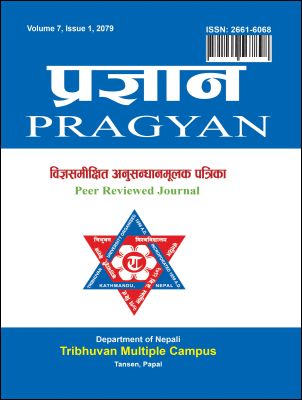‘लछमनियाँको गौना’ कथामा सामाजिक समस्या {Social Problems In The Story 'Lachhamanianko Gauna'}
DOI:
https://doi.org/10.3126/pragyan.v7i1.55156Keywords:
अन्तर्देशीय Inland, गौना Gouna, घरज्वाइँ house-in-law, दुरावस्था poverty, लैङ्गिक समस्या gender issues.Abstract
प्रस्तुत लेखमा सनत रेग्मी (सनतकुमार रेग्मी) द्वारा रचित लछमनियाँको गौना कथामा सामाजिक समस्याहरूको निरूपण गरी अध्ययन विश्लेषण गरिएको छ । शोध्यप्रश्नको रूपमा प्रस्तुत गरिएको जिज्ञासाको प्राज्ञिक समाधानका लागि पाश्चात्य साहित्य सिद्धान्तमा देखा परेर विकसित हुँदै आएको यथार्थवादसम्बन्धी अवधारणाको आधार लिइएको छ । कृतिको अर्थापनका लागि स्थापित सिद्धान्तका आधारमा सघन पाठविश्लेषण विधिअनुसार सूक्ष्म पठन गरी सन्दर्भपरक अध्ययन गरिएकाले प्रस्तुत अध्ययन गुणात्मक प्रकृतिको छ । विवेच्य कथामा प्रस्तुत सामाजिक यथार्थवादसम्बन्धी समस्याका विषयलाई मूल प्राज्ञिक समस्या बनाएर त्यसको समाधान खोज्न कृतिमा बालविवाह, पारिवारिक समस्या, यौनमनोवैज्ञानिक समस्या, अन्धविश्वासजन्य समस्या, क्षेत्रीय र सम्पत्तिको प्रलोभनले निम्त्याएका समस्या, लैङ्गिक समस्या, अन्तर्देशीय वैवाहिक सम्बन्धले निम्त्याएका समस्या, अशिक्षा र भ्रमबाट सिर्जित समस्या, छिमेकीबाट हुने समस्या जस्ता सामाजिक यथार्थवादसम्बन्धी विविध समस्याका आधारमा मात्र अध्ययन गरिएको छ । नेपालको मधेसी समाजमा सानैमा बिहे गरिदिने र केटी ठुली भएपछि गौना गरेर केटाको घरमा पठाउने कुप्रचलनको सिकार भएका तमाम चेलीहरूको प्रतिनिधित्व प्रस्तुत कथाकी लछमनियाँले गरेकी छ । लछमनियाँ बुद्धू तेली र उसकी दृष्टिविहीन श्रीमतीकी एक्ली सन्तान भएकीले छोरीबिना घरै नचल्ने भएपछि बुद्धूले उसलाई गौना गरेर पठाउनुभन्दा घरज्वाइँ राखेर उसैलाई बुढेसकालको सहारा बनाउन चाहेको र ज्वाइँले पनि घरज्वाइँ बस्नुभन्दा त्यो सम्बन्ध नै तोडेर अर्की बिहे गर्न खोजेको कुराको सब्केत कथामा गरिएको छ । बाबु र लोग्नेका आ–आफ्नै अडानको मारमा परेकी लछमनियाँ जवान भइसक्दा पनि घरबार बिग्रला कि भन्ने त्रासमा लोग्ने लिन आएको सपना देख्दै माइत बस्न विवश भएकी छ र अन्त्यमा लोग्ने भेट्न आकुलव्याकुल भएकी लछमनियाँलाई अर्को एउटा बेइमान छट्टुले झुक्याएर लगेको कारुणिक कथा प्रस्तुत गरेर सामाजिक दुरावस्थास्थालाई देखाइएकाले प्रस्तुत कथालाई सामाजिक समस्याका कोणबाट अध्ययन गर्न सकिने निष्कर्ष प्राप्त भएको छ ।
{In the present article, social problems are depicted and analyzed in Lachhamaniya's Gouna Katha written by Sanat Kumar Regmi. For the academic solution of the questions presented as a research question, the basis of the concept of realism, which has appeared in the Western literary theory and has been developed, has been taken. Based on the principles established for the interpretation of the work, the presented study is of a qualitative nature, as the detailed reading and contextual studies were done according to the intensive textual analysis method. The problem of social realism presented in the critical story is made into a basic academic problem and to find a solution to it. It has been studied only on the basis of various problems related to social realism such as problems. In the Madhesi society of Nepal, Lachhamaniya represented all the girls who were victims of the bad practice of marrying off at a young age and sending the girl to a boy's house after she grows up. Lachhamaniya is the only child of Buddhu Teli and his blind wife, and since she cannot live without a daughter, Buddhu wants to support her in her old age by having a son-in-law instead of sending her away, and the son-in-law also tries to break the relationship and get another marriage instead of living as a son-in-law. Lachhamaniya, who is beaten by her father and her husband's own attitude, even though she is young, she is forced to live with her husband, dreaming that her husband will come to take her, even though she is young. A conclusion that can be studied from the angle of social problems has been obtained.}




